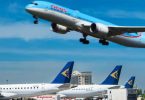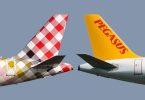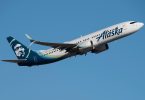SINGAPORE – Budget airline Scoot is offering iPads to long-haul travellers after ripping out aircraft entertainment systems weighing more than two tonnes to save fuel.
The tablets helped the carrier cut 7 per cent off the weight of planes obtained from parent Singapore Airlines even after a 40 pre cent increase in seating, the chief executive officer Campbell Wilson said. The savings will help Scoot, which made its maiden flight to Sydney on Monday, cope with fuel prices that have jumped about 36 per cent in two years.
Fuel is “the number one worry” for any airline, as it usually accounts for at least 40 per cent of costs, Wilson said. Scoot will charge economy passengers about $17 a trip to rent the tablets, which are loaded with movies, music, games and television shows.
Cutting costs and finding new sources of revenue will be key for Singapore-based Scoot as it seeks to make a profit flying older aircraft than other low-cost carriers and selling tickets as cheap from about $179 one-way from Sydney to Singapore. Singapore Air formed Scoot after budget operators led by Jetstar and AirAsia won 26 per cent of the city’s air-travel market.
The iPads are “a very smart move,” said Corrine Png, JPMorgan Chase’s Singapore-based head of regional transportation research. “If they can make the aircraft lighter, it does help improve fuel efficiency.”
The budget carrier will loan the iPads free to passengers in its business-class seats. It also eventually intendsletting users access content via a wireless system on planes. Qantas began trials of a similar product in December.
The carrier will have four Boeing 777s this year, each fitted with 400 seats, including 32 in business class. The airline will add its second destination, the Gold Coast, next week. Services to Tianjin, China will begin in August followed by two other northern Chinese cities before the end of the year, Wilson, 40, said.
“China has a huge amount of potential,” he said. “It’s developing fast and the propensity of people there to spend is increasing dramatically.”
China will probably be the world’s fastest-growing aviation market through 2014, with international passenger numbers swelling at an average 11 per cent, the International Air Transport Association said last year.
Scoot plans to increase its fleet to as many as 14 B-777s by the middle of the decade. The carrier will be able to pare maintenance costs by working with its parent, Wilson said.
Singapore Air also owns regional carrier SilkAir and has a stake in short-haul budget carrier Tiger Airways.






















